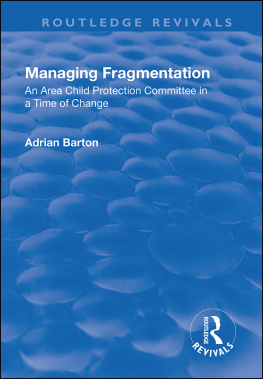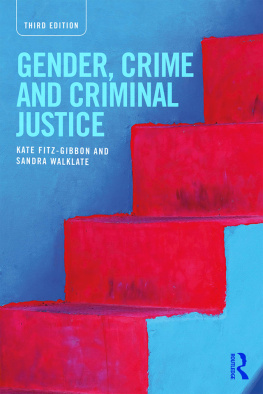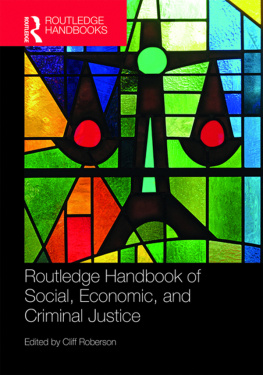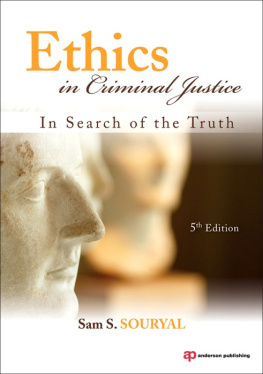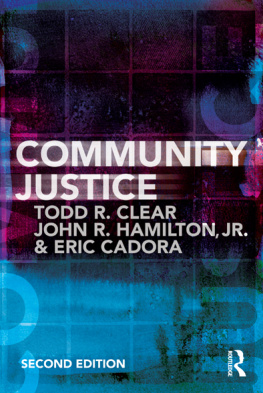
The Policy-Making Process in the Criminal Justice System
How the state deals with crime and criminality is a major issue for all students of criminology and criminal justice. This book offers a fresh perspective on the policy-making process in the criminal justice system of England and Wales by presenting a detailed overview of both the theory behind it and how it plays out in practice with contemporary policy examples.
The key features of this text include a detailed analysis of the basic political concepts surrounding the relationship between the citizen and the state as well as an overview of the state departments, organizations and individuals that are instrumental in creating and influencing policy. The book also analyses how criminal justice policy is interpreted and implemented on the street and comprises a range of discussion points and suggested further readings.
By taking a unique criminal justice-focused approach to policy making, this text is perfect for the undergraduate taking modules in criminology, criminal justice, policing, the voluntary sector and social and public policy. It will also be of interest to those who are taking more vocational routes and to practitioners.
Adrian Barton is an Associate Professor (Senior Lecturer) in Public Management and Policy at Plymouth University, UK. His background is in social policy and criminal justice. This is reflected in his primary research interests, which are substance use and child protection. He has published widely in this area, including a number of books, refereed journal articles and practice-based publications.
Nick Johns is Senior Lecturer in Social and Public Policy at Cardiff University, Wales. His research interests lie in race issues, ethnic diversity and welfare, sentencing policy and social welfare. He is co-author of Trust and Substitutes for Trust: The Case of Britain under New Labour (New York: Nova Science).
First published 2013
by Routledge
2 Park Square, Milton Park, Abingdon, Oxon, OX14 4RN
Simultaneously published in the USA and Canada
by Routledge
711 Third Avenue, New York, NY 10017
Routledge is an imprint of the Taylor & Francis Group, an informa business
2013 Adrian Barton and Nick Johns
All rights reserved. No part of this book may be reprinted or reproduced or utilised in any form or by any electronic, mechanical, or other means, now known or hereafter invented, including photocopying and recording, or in any information storage or retrieval system, without permission in writing from the publishers.
Trademark notice: Product or corporate names may be trademarks or registered trademarks, and are used only for identification and explanation without intent to infringe.
British Library Cataloguing in Publication Data
A catalogue record for this book is available from the British Library
Library of Congress Cataloging in Publication Data
Barton, Adrian.
The policy making process in the criminal justice system / Adrian Barton
and Nick Johns.
p. cm.
1. Criminal justice, Administration of--Great Britain. 2. Criminology--Great
Britain. I. Johns, Nick. II. Title.
HV9960.G7B37 2012
364.9410684--dc23
2012016746
ISBN: 978-0-415-67014-2 (hbk)
ISBN: 978-0-415-67017-3 (pbk)
ISBN: 978-0-203-10121-6 (ebk)
Typeset in Times New Roman
by Taylor & Francis Books
Contents
Foreword and acknowledgements
We are undeniably in a state of flux in terms of politics and policy. We have a coalition government for the first time in many decades and it is fair to say that it is working its way through a different and challenging set of working arrangements. In addition, we are seeing a global fiscal crisis manifesting in the United Kingdom as a period of austerity where government spending is being withdrawn or reduced in all areas of public provision. In addition, we are seeing a crisis in the financial stability of the eurozone and an economic slump in the USA, and the latest figures show a slowdown in Chinas growth. Furthermore, there is the very real prospect of the break-up of the UK with a referendum in Scotland.
Given all this, we feel that it is important that those studying aspects of public policy of which criminology and criminal justice are undoubtedly a significant part have a grasp of the key determinants, options, barriers and outcomes of the policy-making process in order that they better understand how and why, and, importantly, why not, certain types of policy are made and implemented. For us, an inability to do this runs the risk of creating a partial understanding of an important aspect of all governments work.
With this in mind we set about producing this work. It was written with the express intent of giving criminal justice and criminology students a basic and accesible insight into the world of policy making. As a result we have sacrificed depth for breadth. The reasons for this are simple: this is an introductory textbook aimed at a specific group of readers. Our aims were to cover the key areas of policy making in a manner which allowed the reader to come away from the text with an understanding which, at one level, would allow them to comprehend, in a very general way, the complexity inherent in policy making and policy doing; at another level, we hope that some readers become as fascinated by policy making as we are and choose to do further reading in order to obtain a greater depth of knowledge.
Finally, as in all our work, we take full responsibility for what follows. That said, work such as this does not take place without the input of others and wed like to take this opportunity to thank some of the people who helped us complete this book. First, wed like to thank three cohorts of criminology and criminal justice students who, unknowingly, fed into the development of this project; wed like then to thank the editorial team at Routledge for their help, advice and patience in the writing of this. Finally, wed like to thank the people who have had to live with us as we completed this volume never an easy task! Nick would like to thank Heather, Ben and Matthew for their continued support. Adrian would like to thank Quinnie for always being around.
1
Introduction
Origins of this book
As authors and academics we share a commitment to interdisciplinary working within the social sciences. Since we both started out in the field of social policy, perhaps this should be no surprise. One of the central features of social policy, in terms of both its application and its study, as far as we are concerned is that it is something of a magpie field (Blakemore, 1998), drawing evidence about the things that impact on welfare or well-being from every available source and as a result crossing a number of academic disciplines. Whilst this occasionally eclectic approach can be seen as a weakness at times, we strongly believe that being able to draw from a variety of sources allows a deeper understanding of social problems often in a more holistic way than unitary discipline pathways. It has provided us with the ability to teach and research in a number of areas over the years, including criminology and criminal justice studies. It was essentially as a result of our experience of teaching policy-related issues to criminology and criminal justice students that the idea for this book took shape.
Despite the reality that criminology, but more so criminal justice studies, is arguably a specific branch of social policy, in many areas and many programmes we found that the process of policy making is an underdeveloped aspect of the curriculum (and, as an aside, we would suggest it is a neglected aspect in some types of criminal justice and criminological research). The result of this fundamental lack of understanding about how policy is made, for whom, by whom and the constraints that policy makers and policy doers operate under, led otherwise perfectly able students to make unfounded criticisms of current arrangements and put forward unachievable utopian suggestions for policy advances. As Ismaili (2006: 255) points out:


